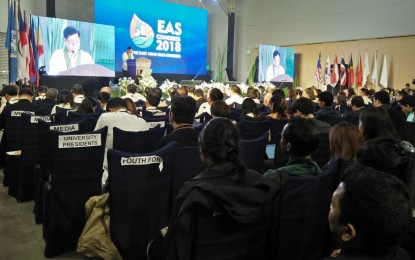
Environment Secretary Roy Cimatu underscores various Philippine initiatives to protect coastal and marine resources at the opening of the four-day East Asian Seas (EAS) Congress held at the Iloilo Convention Center on Tuesday (November 27, 2018). (Photo by Perla Lena)
ILOILO CITY -- Environment Secretary Roy Cimatu on Tuesday underscored the need for strengthened measures in the preservation of coastal and marine ecosystems to “ensure food security and improve poverty reduction”.
“The Philippine government has recognized the critical role of the environment and natural resources, particularly of our coasts and oceans, in the sustainable development of the country. Located in the apex of the coral triangle, the region is known as the center of marine shorefish biodiversity,” he said in welcoming close to a thousand delegates during the opening of the four-day East Asian Seas (EAS) Congress, which was held at the Iloilo Convention Center in this city.
In terms of coastal and marine protection, he cited the initiatives of the government that are aligned with the integrated coastal management (ICM), and are being promoted by the Partnerships in Environmental Management for Seas of East Asia (PEMSEA).
Cimatu said Executive Order (EO) no. 533 signed in 2009 served as the primary framework for all coastal and marine conservation initiatives. The DENR was tasked to develop a national ICM program giving direction to its implementation down to the local level.
ICM has also been mainstreamed in the 2017-2022 Philippine Development Plan, serving as one of the major strategies to “ensure ecological integrity and clean and healthy environment”.
DENR includes coastal and marine ecosystems management program in its top 10 programs to “comprehensively manage and address the challenges on coastal and marine ecosystems in collaboration with local governments, non-government organizations and other stakeholders”.
Another key strategy of the government, he said, is the establishment of marine protected areas (MPAs), to also include the declaration of the portion of the Philippine Rise as a marine reserve on May 15, 2018.
He also enumerated various rehabilitation efforts of bodies of water such as the Manila Bay and the Boracay Island.
The country also maintains international multilateral agreements as well as adopts “sustainable tourism management approach” in areas dubbed as destinations for tourists.
“If nature-based tourism will effectively and efficiently be put in place, not only we will be able to sustainably manage coastal resources, but we can also generate revenues for both government and coastal communities,” Cimatu underscored.
In his message, he reiterated the commitment of the Philippine government to support PEMSEA’s Sustainable Development Strategy for the Seas of East Asia (SDS-SEA).
‘The country looks forward to the next steps ahead for PEMSEA which includes more scientific research for baseline data, strengthening transboundary cooperation among the MPAs, undertaking resource valuation studies, sourcing green financing, scaling up of commitment countries and non-country partners and consistently promoting adoption and implementation of ICM,” he said.
The conference is organized by the DENR and PEMSEA and anchors on the theme “25 Years of Partnerships for Healthy Oceans, People and Economies: Moving as One with the Global Ocean Agenda”.
The EAS Congress is a tri-annual event and participated in by delegates from PEMSEA partner countries such as Cambodia, China, Indonesia, Japan, North Korea, Laos, South Korea, Singapore, Timor Leste and Vietnam.
It also gathered delegates from non-member countries such as Malaysia, Thailand, United States, United Kingdom, Sweden, Switzerland, France and Australia.
Around 63 percent of the delegates are from foreign countries and the rest are local delegates. (PNA)
